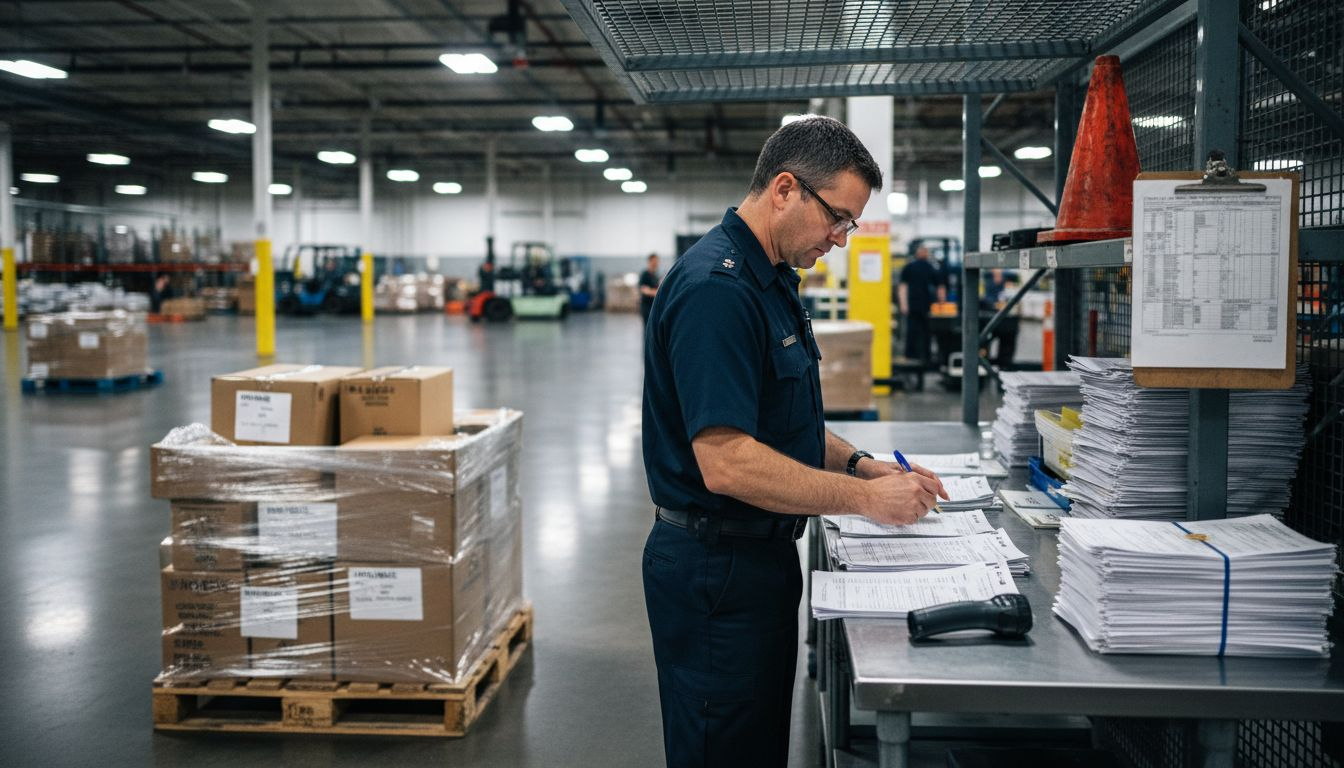Brokers and freight forwarders quietly shape the backbone of global trade, making sure goods cross borders and oceans every day. Freight forwarders actually carry direct responsibility for shipments, while brokers never even touch the cargo. That sounds simple, right? Not quite. The surprising truth is the biggest risk and cost differences for your business depend on exactly who you trust with your next shipment.
Table of Contents
- Defining Brokers And Freight Forwarders: Roles And Responsibilities
- Understanding The Importance Of Brokers And Freight Forwarders In Trade
- How Brokers And Freight Forwarders Facilitate International Shipping
- Key Differences Between Brokers And Freight Forwarders: A Comparative Analysis
- Navigating The Choice: When To Use A Broker Or A Freight Forwarder
Quick Summary
| Takeaway | Explanation |
|---|---|
| Freight forwarders manage entire shipping processes. | They consolidate shipments, handle documentation, and ensure customs compliance for smooth international logistics. |
| Brokers connect shippers with carriers. | Acting as intermediaries, brokers negotiate rates and arrange transport without physically handling the goods. |
| Choose freight forwarders for complex logistics needs. | Larger shipments or multiple transportation modes require end-to-end solutions that freight forwarders specialize in. |
| Brokers are ideal for simple shipping arrangements. | They offer targeted solutions for small to medium shipments with less frequent international handling needs. |
| Evaluate costs versus services when selecting logistics partners. | Understand your business needs to choose between the broader service of freight forwarders and the focused services of brokers. |
Defining Brokers and Freight Forwarders: Roles and Responsibilities
In the complex world of international shipping and logistics, brokers and freight forwarders play critical yet distinct roles that are essential for smooth global trade operations. While these terms are often used interchangeably, they represent unique professional services with specific responsibilities and operational scopes.
What is a Freight Forwarder?
A freight forwarder acts as a comprehensive logistics expert who manages the intricate process of transporting goods across international boundaries. Unlike simple transportation providers, freight forwarders offer end-to-end shipping solutions that include:
- Consolidating shipments from multiple clients
- Negotiating transportation rates with carriers
- Preparing necessary documentation for international shipping
- Managing customs clearance procedures
- Providing cargo insurance and tracking services
According to the Federal Motor Carrier Safety Administration, a freight forwarder organizes shipments by assembling and consolidating cargo, providing distribution services, and often assuming direct responsibility for the transportation process.
Understanding the Role of a Broker
A broker functions differently from a freight forwarder, serving primarily as an intermediary who connects shippers with transportation carriers. Brokers do not physically handle or transport goods themselves but instead focus on facilitating logistics arrangements. Their primary responsibilities include:
- Matching shippers with appropriate transportation providers
- Negotiating shipping rates and contract terms
- Verifying carrier credentials and insurance
- Managing administrative documentation
- Ensuring compliance with shipping regulations
The key distinction is that brokers act as agents who coordinate shipping logistics without taking physical possession or direct responsibility for the cargo. Our trusted customs brokerage services can help businesses navigate these complex international shipping requirements with expertise and precision.
Understanding the Importance of Brokers and Freight Forwarders in Trade
In global commerce, brokers and freight forwarders serve as critical infrastructure that enables seamless international trade, transforming complex logistics challenges into manageable, efficient processes. Their expertise helps businesses navigate the intricate landscape of cross-border transportation, regulatory compliance, and supply chain management.
Economic Impact and Risk Mitigation
Brokers and freight forwarders play a pivotal role in reducing economic risks associated with international shipping. By leveraging their specialized knowledge, they help businesses minimize potential financial losses through:
- Navigating complex customs regulations
- Identifying cost-effective shipping routes
- Ensuring proper documentation and compliance
- Mitigating potential shipping delays and complications
- Providing strategic logistics planning
According to the International Trade Administration, these professionals are essential in helping importers and exporters meet federal requirements and successfully manage international shipping challenges.
Strategic Logistics and Global Connectivity
Moreover, brokers and freight forwarders are instrumental in creating global connectivity for businesses of all sizes. They transform logistical obstacles into strategic opportunities, enabling companies to expand their market reach and operational efficiency. Learn more about our global shipping solutions to understand how professional logistics management can drive business growth.
By bridging communication gaps between shippers, carriers, and regulatory bodies, these professionals ensure that goods move smoothly across international borders, supporting the intricate ecosystem of global trade. Their expertise not only facilitates transportation but also provides businesses with the confidence to explore new markets and economic opportunities.
How Brokers and Freight Forwarders Facilitate International Shipping
International shipping requires intricate coordination and expert navigation through complex regulatory landscapes. Brokers and freight forwarders serve as essential partners that transform challenging logistics into streamlined, efficient processes, enabling businesses to expand their global reach with confidence.
Documentation and Compliance Management
One of the most critical functions of brokers and freight forwarders is managing the extensive documentation required for international trade. These professionals ensure complete compliance with international shipping regulations by handling critical paperwork such as:
- Commercial invoices
- Bills of lading
- Certificate of origin
- Export and import licenses
- Customs declaration forms
According to the International Trade Administration, these professionals are instrumental in helping businesses meet federal requirements and navigate complex international shipping protocols.
Transportation Network Optimization
Brokers and freight forwarders leverage extensive global networks to create efficient and cost-effective shipping solutions. They analyze multiple transportation routes, negotiate competitive rates with carriers, and select the most appropriate shipping methods based on specific cargo requirements. Explore our comprehensive shipping solutions to understand how professional logistics management can transform your international trade strategy.
By understanding nuanced regulations, managing intricate documentation, and developing strategic transportation plans, brokers and freight forwarders essentially act as navigators in the complex world of global commerce. Their expertise reduces risks, minimizes potential delays, and provides businesses with a competitive edge in international markets.
Key Differences Between Brokers and Freight Forwarders: A Comparative Analysis
In the intricate world of international logistics, brokers and freight forwarders are often misunderstood as interchangeable roles. However, these professionals have distinct responsibilities, operational scopes, and strategic functions that significantly impact global trade processes.
Scope of Service and Responsibility
The fundamental difference between brokers and freight forwarders lies in their level of service and cargo responsibility. Freight forwarders provide comprehensive logistics solutions, while brokers focus on specific transportation arrangements:
-
Freight Forwarders:
- Manage entire shipping process from origin to destination
- Consolidate and handle physical cargo movement
- Provide end-to-end logistics solutions
- Assume direct responsibility for shipments
-
Brokers:
- Connect shippers with transportation carriers
- Negotiate rates and arrange transportation
- Manage documentation and compliance
- Do not physically handle or transport goods
According to the International Trade Administration, these professionals play unique but complementary roles in facilitating international trade.
Financial and Legal Implications
The operational differences between brokers and freight forwarders extend to significant financial and legal considerations. Freight forwarders typically carry more comprehensive liability, often requiring more extensive insurance and legal protections. Learn about our specialized shipping solutions to understand how professional logistics management navigates these complex requirements.
Ultimately, while brokers and freight forwarders might seem similar, they represent specialized professionals addressing different aspects of international shipping. Their complementary roles ensure smooth, efficient, and compliant global trade operations, helping businesses navigate the complex landscape of international logistics.
To help clarify the distinction between brokers and freight forwarders for readers, the following table compares their roles, scope of service, and responsibilities at a glance.
| Aspect | Freight Forwarder | Broker |
|---|---|---|
| Main Function | Manages entire shipping process | Connects shippers with transportation carriers |
| Handles Physical Cargo | Yes | No |
| Scope of Service | End-to-end logistics solutions | Arranges specific transportation needs |
| Assumes Shipment Responsibility | Yes | No |
| Typical Use Case | Complex, large, or multinational shipments | Simple, small to medium shipments |
| Involvement in Documentation | Prepares and manages all documentation | Manages administrative paperwork |
| Provides Cargo Insurance | Yes | No |

Navigating the Choice: When to Use a Broker or a Freight Forwarder
Selecting the right logistics partner is crucial for businesses engaged in international trade. Understanding when to utilize a broker or a freight forwarder can significantly impact shipping efficiency, cost-effectiveness, and overall supply chain performance.
Business Scale and Shipping Complexity
The decision between a broker and a freight forwarder often depends on the specific needs of your business and the complexity of your shipping requirements. Consider these key factors:
-
When to Use a Broker:
- Small to medium volume shipments
- Standard, straightforward transportation needs
- Limited international shipping frequency
- Minimal need for comprehensive logistics management
-
When to Use a Freight Forwarder:
- Large, complex international shipping operations
- Multiple transportation modes required
- Need for end-to-end logistics solutions
- Frequent international trade activities
According to the International Trade Administration, these professionals offer specialized services tailored to different business logistics requirements.
Financial and Operational Considerations
Businesses must carefully evaluate their budget, shipping volume, and operational complexity when choosing between a broker and a freight forwarder. Freight forwarders typically provide more comprehensive services but at a higher cost, while brokers offer more targeted, cost-effective solutions for simpler shipping needs. Explore our comprehensive shipping consultation services to determine the most suitable logistics strategy for your business.
Ultimately, the choice between a broker and a freight forwarder is not one-size-fits-all. Successful international shipping requires a nuanced understanding of your specific business needs, global trade requirements, and the unique capabilities of these logistics professionals.
This table summarizes the key factors to help businesses decide whether a broker or freight forwarder is better suited for their shipping needs based on scale and operational complexity.
| Factor | When to Use a Broker | When to Use a Freight Forwarder |
|---|---|---|
| Shipment Volume | Small to medium shipments | Large, ongoing, or high-volume shipments |
| Shipping Complexity | Straightforward logistics needs | Complex/multimodal and international logistics |
| Frequency of International Shipments | Occasional or infrequent | Regular, frequent |
| Need for End-to-End Service | Minimal | Essential |
| Budget Considerations | Cost-effective for targeted shipments | Willing to invest in comprehensive solutions |

Unlock Clarity and Control in Global Shipping
Are you struggling to decide between a broker and a freight forwarder for your international shipments? The differences can be confusing. Misunderstandings in logistics roles can lead to delays, unexpected costs, and compliance headaches. The article highlights the challenges businesses face with documentation, customs clearance, liability, and overall supply chain management. At Worldwide Express, we understand that making the wrong choice can disrupt your entire global operation.

Take charge of your global logistics today. Partner with a proven leader who delivers both comprehensive freight forwarding and expert customs brokerage under one roof. With Worldwide Express, you gain:
- Seamless coordination between all parties
- Full visibility and cargo tracking
- Customized solutions for import and export
Visit our main site now to request your tailored logistics plan. Ensure your next international shipment is handled with experience and precision. The right partner makes all the difference when every shipment counts.
Frequently Asked Questions
What is the primary role of a freight forwarder?
A freight forwarder manages the entire logistics process of transporting goods internationally, providing services such as shipment consolidation, negotiating rates, preparing documentation, and handling customs clearance.
How does a broker differ from a freight forwarder?
A broker serves as an intermediary between shippers and transportation carriers, focusing on arranging logistics and negotiating shipping rates, whereas a freight forwarder is responsible for managing the logistics process and physically handling the shipment.
When should I use a broker instead of a freight forwarder?
Consider using a broker for small to medium-volume shipments with straightforward transportation needs. Brokers are ideal for businesses with limited international shipping frequency and minimal logistics complexity.
What are the financial implications of using a freight forwarder?
Freight forwarders typically require more comprehensive liability coverage and insurance, as they assume direct responsibility for shipments. This can lead to higher costs compared to brokers, who primarily coordinate and do not handle shipments directly.






